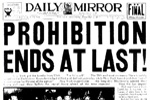
Word of the Day: Acquiesce
The Mirriam-Webster word of the day for today is the verb acquiesce. According to the dictionary’s website, it means “to accept, comply, or submit tacitly or privately—often used with in or to” (https://www.merriam-webster.com/word-of-the-day). Mirriam-Webster elaborates, “It arrived in English in the early 1600s, via the French acquiescer, with the senses ‘to agree or comply’ and ‘to rest satisfied’ (this latter sense is now obsolete). An early example of the word acquiesce in the sense of ‘to agree or comply’ can be found in the writings of the English philosopher Thomas Hobbes who, in his 1651 masterpiece, Leviathan, argued that people must subject themselves completely to a sovereign and should obey the teachings of the church. Encouraging his readers to adopt his position he wrote, ’Our Beleefe … is in the Church; whose word we take, and acquiesce therein.’”
According to www.etymonline.com, the word originates ”from Latin acquiescere/adquiescere ‘become quiet, remain at rest, rest, repose,’ thus ‘be satisfied with, be content,’ from ad ‘to’ (see ad-) + quiescere ‘become quiet,’ from quies (genitive quietis) ‘rest, quiet’ (from PIE root *kweie- ‘to rest, be quiet’).” So that original sense, “to rest satisfied,” makes sense.
December 5 is Repeal Day. Some people even celebrate it. But what is repeal day.
On January 16, 1919, Nebraska became the 36th state of the 48 United States to approve the 18th Amendment (North Carolina, Utah, Missouri, and Wyoming also voted in favor of it on the same day, but Nebraska gets the credit). The 18th Amendment, which was introduced in the Senate in 1917 and passed both House and Senate that same year, prohibited the manufacture, sale, or distribution of alcoholic beverages throughout the United States. It did not ban the consumption of alcohol, but it made alcohol very hard to acquire.
In order to implement the 18th Amendment, Congress passed a bill known as the Volstead Act (named after Andrew Volstead from Minnesota). Wikipedia says of the Volstead Act that it “was largely a failure, proving unable to prevent mass distribution of alcoholic beverages and also inadvertently causing a massive increase in organized crime.[18] The act would go on to define the terms and enforcement methods of prohibition, until the passing of the 21st amendment in 1933 effectively repealed it” (https://en.wikipedia.org/wiki/Eighteenth_Amendment_to_the_United_States_Constitution).
The movement to ban alcohol was led by the Christian Women’s Temperance Union and the Anti-Saloon Leauge. The ASL “led speeches, advertisements, and public demonstrations, claiming that banning the sale of alcohol would get rid of poverty and social issues, such as immoral behavior and violence. It would also inspire new forms of sociability between men and women and they believed that families would be happier, fewer industrial mistakes would be made and overall, the world would be a better place.”
The 18th Amendment was considered a “progressive amendment,” meaning that it was part and parcel of the progressive movement in the United States. Progressives believe that society can be improved through education, technology, and the wise application of laws designed to improve the lives of the people over whom the progressives rule. Of course, the people whose lives are so benefited don’t always appreciate the blessings imposed upon them.
Probably the most important benefit of the progressives’ imposition of Prohibition on the United States was the rise of organized crime. According to the wiki on the 18th Amendment, “Bootlegging itself was the leading factor that developed the organized crime-rings in big cities, given that controlling and distributing liquor was a very difficult task to achieve. From that arose many profitable gangs that would control every aspect of the distribution process, whether it be concealed brewing and storage, operating a speakeasy, or selling in restaurants and nightclubs run by a specific syndicate. With organized crime becoming a rising problem in the United States, control of specific territories was a key objective among gangs, leading to many violent confrontations; as a result, murder rates and burglaries heavily increased between 1920 and 1933. Bootlegging was also found to be a gateway crime for many gangs, who would then expand operations into crimes such as prostitution, gambling rackets, narcotics, loan-sharking, extortion and labor rackets, thus causing problems to persist long after the amendment was repealed.” And we still have those gangs today, so it was a lasting blessing.
One might wonder why Prohibition didn’t work. The answer is that people generally do not acquiesce to the moral imperatives of others. People have their own moral standards, sometimes good, sometimes not so good. But the progressives still haven’t figured that out—they are still, 100 years later, trying to force people to behave according to their progressive moral standards.
In February of 1933, Congress proposed the 21st Amendment, which put an end to Prohibition and changed the Volstead Act. It was approved by the 36th state, Utah, in December of 1933. We celebrate this day, Repeal Day, because it returned a bit of power to the people—the power to make our decisions about our bodies, what we consume, how we live our lives.
If you think avoiding alcohol is a good idea, persuade people. If you try to force them to abide by your standards, don’t be surprised if they do not acquiesce.
The image is from the webpage http://www.repealday.org/.